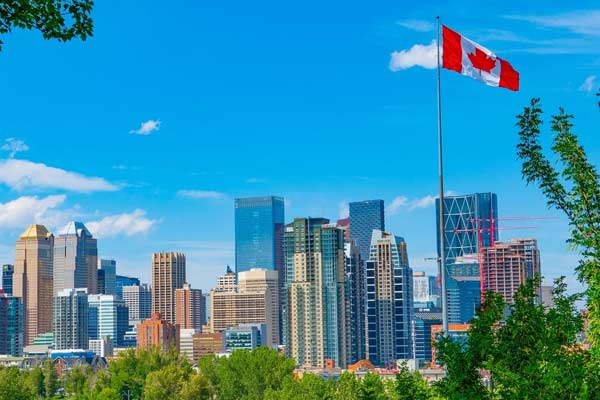The Surprising Truth about Socialism in Canada
Is Canada a socialist country? American politicians and talking heads target Canada as an example of a nation run according to socialist principles, an example of socialism-in-action.
Proponents of the “Canada is a socialist country” theory point out that the no-cost healthcare system and other welfare-state programs in place are drawn directly from socialist ideology.
In Canada, socialism has a limited impact on the way the country operates. Canada has a mixed economy, and the country’s system of government is best described as a parliamentary democracy. Neither of these facts automatically identifies Canada as “socialist.”
Because Canada embraces free-market principles, even as it relies on regulation and occasional state intervention, it’s not fair to say that it’s a socialist country.
Here’s the surprising truth about socialism in Canada – it’s not nearly as impactful (or as prevalent) as you may have been led to believe.
Defining Socialism
Attempts to define socialism usually fail. It’s a big concept that covers a wide spectrum of beliefs. Defining it is akin to defining “love” or “hate,” difficult at best, mostly frustrating.
For starters, socialism is an ideology, not a form of government. For a country to be socialist, it would need to be founded as such, identified as such in official declarations, and directly connected to a socialist ideology.
Socialism is an umbrella term for a set of different political and economic theories. The thing that ties them together is an advocacy for the good of the community over the good of any individual.
Socialism stands in contrast to a free-market ideology that socialists say prizes private ownership over the public good.
You can shorthand things by saying that any ideology that leads to the equitable distribution of property and wealth is socialist. By that definition, socialists come in many flavors.
They exist on a political spectrum; you’ve got command economy Communists on the extreme left, market socialist libertarians on the movement’s far-right, and a rainbow of possibilities in-between.
What’s Canada’s System of Government?
Canada is a parliamentary democracy. Let’s unpack that and look for signs of socialism.
Parliamentary democracies are governments in which democratically-elected leaders are accountable to a legislative body called a parliament.
Canada is technically a constitutional monarchy, in which a monarch (currently Elizabeth II) is the head of state while an elected executive acts as the head of government.
Parliamentary governments are used all over the world – most of Europe and the Caribbean are run on this model, as are many governments in Oceania and those of former British colonies. By no means are these countries “socialist.”
The system of government in Canada doesn’t particularly recognize or enforce the tenets of socialism, nor does it require the government to run along with socialist principles.
What’s Canada’s Economic System?
Capitalism and socialism are not generally in conflict. Many socialists also believe in capitalist ideals. That’s the case in Canada, where a mixed economy is among the most productive on the global stage.
Canada’s mixed economy is a blend of a traditional market economy and a socialist-style planned economy. The word “mixed” in the phrase “mixed economy” refers to this mix of public and private enterprise.
Canada’s economy follows free-market principles (private ownership) along with socialist practices (state interventionism) to produce one of the world’s most powerful economic forces.
We can say with confidence that Canada’s economic system, featuring the ninth-largest economy in the world, is a highly-developed, highly-globalized, relatively corruption-free collaboration between standard capitalist practices and those of socialist ideologies.
Does Canada Have Free Healthcare?
The Canadian healthcare system isn’t exactly “free healthcare.” The intervention of the Canadian government, in this one case, controls healthcare costs due to the state’s large negotiating position. It’s a socialist policy enacted by a democratically-elected government.
The national government funds health insurance. Most services are covered by this government-provided health insurance, which operates as the American Medicaid system. Canadian healthcare is a single-payer system – it’s illegal for private insurance to cover anything already covered by the Canadian government.
Nothing in the world is free – Canada’s health services are essentially paid for through taxation.
Because the quality of healthcare doesn’t change based on how much a person pays the Canadian government in taxes, this system technically charges high earners more than low earners. However, most Canadian healthcare services are free at the time of service.
Portugal – an Example of a True Socialist Country
The Portuguese Republic is a good example of a socialist country.
Though Portugal’s system of government isn’t explicitly socialist – it’s a semi-presidential constitutional republic, according to political scientists – the foundational documents of that government endorse the principles of socialist thought: “The Constituent Assembly affirms the Portuguese people’s decision to … open up a path towards a socialist society.”
The difference between the socialist tendencies of modern Canadian politics and the socialist identity of Portugal is the codification of socialist thought into the Portuguese constitution.
Portugal’s mixed economy leans a bit more into state control than does the government of Canada, with many more industries under Portuguese control.
This is mostly a matter of degree – without the explicit mentions of socialism in the constitution, Portugal couldn’t fairly be called socialist.
Conclusion
We can paint socialism and its followers with broad strokes for the sake of convenience – generally, socialists believe the state is better than the free market at things like economic planning.
Socialists are also generally skeptical of the free market’s ability to operate without putting civil liberties in jeopardy.
The free market is alive and well in Canada. As of a 2020 report by the Canadian government, some 1.2 million small businesses operate on Canadian soil. About 39% of the massive Canadian GDP comes from these small businesses, which employ about 70% of the private labor force.
Sometimes it’s easier for us to label something than it is to take the time to understand its complexities. Canada isn’t a socialist country. It’s better described as a country that embraces some aspects of contemporary leftist thought.







